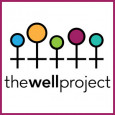This post originally appeared on The Well Project.
If you can read this, or let someone read it to you, and you are sexually active – and you don’t know your status or the status of your partner(s), you are at risk for HIV. Yes, YOU TOO! Woman, man, nonbinary, trans-experience – aged 15 or 75. Doesn’t matter what kind of sex, even if it’s just the tip - there is risk. Go get tested. That’s it. That’s the whole blog.
Kidding.
It could be, but it’s not. I want you to be fully informed so you can operate from knowledge and not from fear or ignorance. By ignorance, I mean not knowing the facts. I was NOT however kidding about your risk. Not knowing, believing in, or recognizing risk is one of the main factors in HIV transmission. I only found out my status because of a random pap smear that I hadn’t even gone to the doctor to have done. It was offered to me as what seemed an afterthought at the time. The offer of the HIV test was a surprise and actually made me realize at the time, I had never been offered one at an OBGYN appointment before. Like a lot of people, I almost didn’t return for the test results because “life” was life-ing. (This is where I tell you to ask for a test at your next OB or prostate exam checkup.) For those of us already positive, if you are reading this, each one - teach one. Tell someone who is still HIV-negative about risk.
So, listen… Forewarned is forearmed. Aside from being a nurse, I am a plain-spoken person. I believe in being blunt so things are clear. If talk about sex, anatomical parts, and/or fluids bothers you, this is not the blog for you and you should stop reading it.
(BUT GO GET TESTED)
To stay on track though, let’s talk about YOUR POTENTIAL risk. I already started it above. Sex is a factor. Even if it’s with your old boyfriend or girlfriend from high school who wouldn’t hurt a fly. Your partner or significant other you have been with or married to for a million years. Whomever! If you don’t know their status (or yours) there is risk. Not all sex is transmissible sex. Mutual masturbation doesn’t pose any real risk, and oral sex is considered very low risk. The virus isn’t passed by touch and it doesn’t fall out of thin air. Penetrative sex poses a risk. Anal is the highest risk, followed by vaginal. The receiving partner is at more risk than the penetrating partner. Also, a note here: Just because you are sexually active with a person who has HIV doesn’t mean you necessarily get it. Their viral load - or how much virus is in the fluids* present (more on this in a sec), and whether or not they are on medication - plays a part. As much as I hate to say it like this, so does plain old “luck”. Also, if a person with HIV is taking their medications regularly and has reached what’s called undetectable status, the chance of transmission is zero. (U=U, also known as Undetectable is Untransmittable.)
A history of STI/STDs makes you more vulnerable. Rough sex has potential to increase transmission because of tears to anal or vaginal tissues; as does age, since in women, the vaginal mucosa tends to be drier after menopause and can tear more easily. These are basically mucus membranes that when torn or abraded allow the virus access. There are things you can do and ways to reduce your risk, including knowing your and your partners HIV status, condom use, and ways to incorporate safer sex activities, but that’s another entire page worth of words, lol.
Notice I am not calling out any behavior. I’m not calling out a type, gender or orientation or group. That’s because it’s not based on behavior or exclusive to any one group. It’s a human condition. Period.
*Fluids: HIV is passed via blood, anal secretions, vaginal secretions, both sperm and pre-seminal fluids, and breast milk. THAT’S IT. Not saliva from kissing. Not sweat. Not tears. Not urine. PERIOD
{P.S. you don’t catch the virus. It’s acquired. Also no one gets AIDS - you acquire HIV, which, if unchecked, can progress to AIDS}
Drug use is a risk factor. If you are struggling with addiction, there are things you can do to reduce your risk of acquiring HIV through drug use. Things such as not sharing needles and using a needle exchange program. If you do use substances with others and share needles, try to find out their status. There are a few other things you can do to reduce risk and I would suggest talking to a substance counselor. Also remember, HIV is not the only risk when injecting substances. Hepatitis B and C are risks. In fact, you can acquire them both from sex as well.
At the end of the day, my point is not to scare you into not having sex. I talk about sex a lot because I am pro sex-positivity and pro self-governance and having autonomy over your own body. The point is knowing your risks. Really, just knowing you are at risk. Self-govern and self-love yourself so you don’t find out at a pap smear or a prostate check up that you are HIV positive. If you do, get into care. We can help.
You matter.
The Well Project is a non-profit organization whose mission is to change the course of the HIV/AIDS pandemic through a unique and comprehensive focus on women and girls. Visit their website, https://www.thewellproject.org/, to access fact sheets (English and Spanish), blogs, and advocacy tools, and to join a global community of women living with HIV.








Comments
Comments